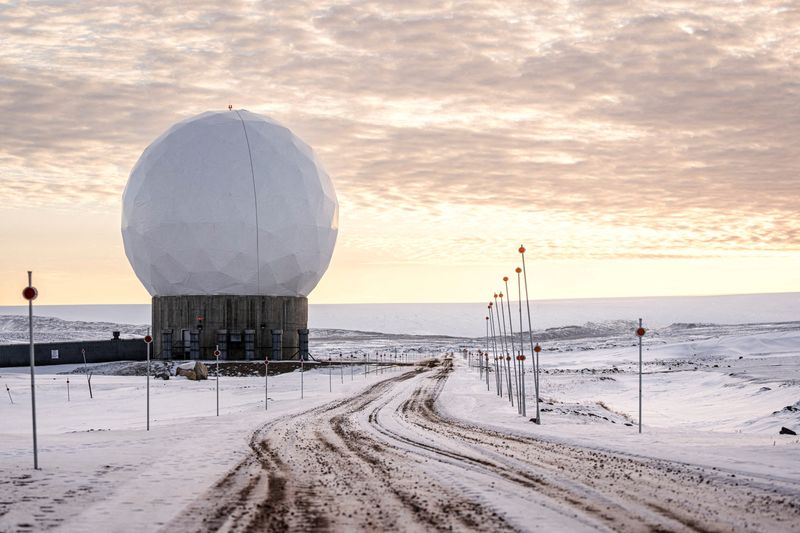By Jacob Gronholt-Pedersen, Louise Rasmussen and Stine Jacobsen
COPENHAGEN (Reuters) -U.S. President-elect Donald Trump says he wants to make Greenland a part of the United States and does not rule out using military or economic power to get Denmark to hand it over.
WHY DOES TRUMP WANT GREENLAND?
Greater control over Greenland could be useful to the United States for its strategic location and its resources. It lies along the shortest route from Europe to North America, vital for the U.S. ballistic missile warning system.
The United States has expressed interest in expanding its military presence, including placing radars there to monitor the waters between the island, Iceland and Britain, which are a gateway for Russian navy vessels and nuclear submarines.
The island, whose capital Nuuk is closer to New York than the Danish capital Copenhagen, boasts mineral, oil and wealth, but development has been slow.
A 2023 survey showed that 25 of 34 minerals deemed “critical raw materials” by the European Commission were found in Greenland. They include materials used in batteries such as graphite and lithium, and so-called rare earth elements used in electric vehicles and wind turbines.
Greenland has banned extraction of oil and natural gas for environmental reasons, and development of its mining sector has been snarled in red tape and opposition from indigenous people.
This has kept Greenland’s economy reliant on fishing, which accounts for over 95% of exports, and annual subsidies from Denmark, which cover roughly half of the public budget. In total, Denmark spends just under $1 billion each year on Greenland, or $17,500 for each of its 57,000 residents.
WHAT PRESENCE DOES THE U.S. HAVE IN GREENLAND NOW?
The U.S. military maintains a permanent presence at the Pituffik air base in Greenland’s northwest.
A 1951 agreement between the United States and Denmark established the United States’ right to construct military bases in Greenland and move forces freely on its territory as long as Denmark and Greenland are notified.
Historically, Denmark has accommodated the U.S. military in Greenland because Copenhagen does not have the capability to defend the vast island itself, and because of U.S. security guarantees to Denmark through the NATO alliance, said Kristian Soeby Kristensen, senior researcher at Copenhagen University’s Centre for Military Studies.
WHAT IS GREENLAND’S STATUS NOW?
Greenland has been controlled by Denmark for centuries, previously as a colony and now as a semi-sovereign territory under the Danish realm. It is subject to the Danish constitution, meaning any change to its legal status would require a constitutional amendment.
In 2009, the island was granted broad self-governing autonomy, including the right to declare independence from Denmark through a referendum.
Prime Minister Mute Egede, who has stepped up a push for independence, has repeatedly said the island is not for sale and that it is up to its people to decide their future.
Decades ago, the U.S. under then-President Harry Truman sought to buy the island as a strategic asset during the Cold War for $100 million in gold, but Copenhagen declined to sell.
Trump offered to buy it during his first term in 2019 but both Greenland and Denmark rejected the proposal.
WHAT DOES GREENLAND WANT?
Relations between Greenland and Denmark have been strained following revelations of historical mistreament of Greenlanders under colonial rule. A majority of Greenland’s inhabitants support independence, but they are divided over the timing and potential impact on living standards.
Greenlandic politicians have since 2019 repeatedly said they are interested in strengthening cooperation and trade with the United States.
However, Aaja Chemnitz, a Greenlandic member of the Danish parliament, said the idea of a U.S. takeover should be firmly rejected. “I don’t want to be a pawn in Trump’s hot dreams of expanding his empire to include our country,” she wrote.
WHAT IF GREENLAND BECOMES INDEPENDENT?
If Greenland becomes independent, it could choose to become associated with the United States in ways that stop short of becoming U.S. territory.
While Greenlanders want independence, they are well aware of their economic reliance on Denmark. One option could be to form a so-called “free association” with the United States that would replace Danish subsidies with U.S. support and protection in return for military rights, similar to the status of Pacific island nations Marshall Islands, Micronesia and Palau.
“Greenland is talking about becoming independent from Denmark, but no Greenlanders want to just switch to a new colonial master,” said Ulrik Pram Gad, a senior researcher and expert on Greenland, who said Greenlanders would probably aim to ensure their future welfare before any vote for independence.
WHAT DOES DENMARK SAY?

Trump’s 2019 offer to buy the island was firmly rejected by Denmark and labelled as “absurd” by Prime Minister Mette Frederiksen. When asked about Trump’s renewed interest this week, Frederiksen said: “We need very close cooperation with the Americans.”
She added: “On the other hand, I would like to encourage everyone to respect that the Greenlanders are a people, it is their country, and only Greenland can determine and define Greenland’s future.”
#ExplainerWhy #Trump #Greenland #Reuters